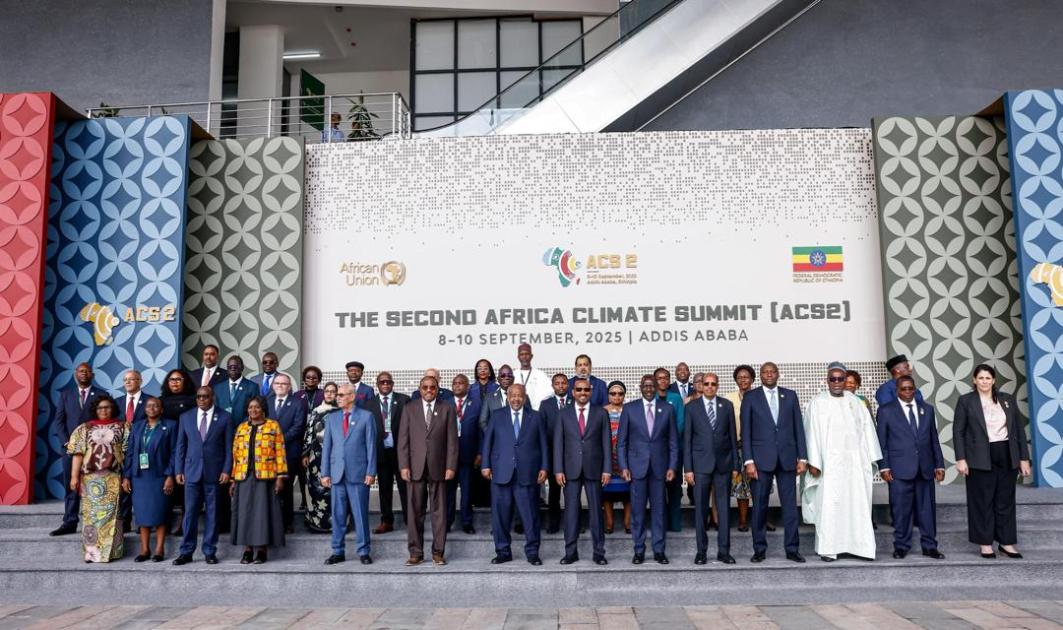African leaders adopt Addis Ababa Declaration as second African Climate Summit ends

The declaration aims to mobilise resources for Africa’s green development and place the continent at the forefront of innovative, homegrown climate solutions.
African leaders have successfully adopted the Addis Ababa Declaration on Accelerating Global Climate Solutions, signalling a historic shift in the continent’s role in global climate action.
The declaration, unveiled alongside the African Climate Initiatives Flagship Report, aims to mobilise resources for Africa’s green development and place the continent at the forefront of innovative, homegrown climate solutions.
More To Read
- Rwanda Cabinet approves reforms on transport, currency, climate
- AU congratulates Ethiopia on winning bid to host COP32 in Addis Ababa
- Kenya, EU ink Sh4.8 billion deal on environment and climate protection
- UNEP warns global cooling demand could triple by 2050 without action
- Climate finance failing the most vulnerable, just 2.8 per cent supports fair transition - ActionAid Report
- The ‘food heroes’ cultivating global change
The declaration marks a turning point, repositioning Africa from being seen as climate-vulnerable to becoming a leader in shaping sustainable, justice-driven solutions. Leaders also launched the Africa Climate Innovation Compact, a platform designed to champion African-led climate initiatives and mobilise resources to accelerate green transitions across the continent.
The compact emphasises the role of innovation, technology and inclusive financing in scaling solutions that address Africa’s dual challenge of climate vulnerability and development needs. Central to the declaration is the recognition of nature-based solutions as a gateway to climate-resilient and green growth, with Ethiopia’s Green Legacy Initiative highlighted as a continental model inspiring millions to restore degraded land.
“By turning our vulnerability into leadership, Africa is showing the world that we are not waiting to be saved; we are driving the change,” African heads of state said in their collective statement.
The leaders emphasised that homegrown solutions are key to ensuring resilience and sustainable prosperity. They called for strengthened and sustained international support to scale up existing initiatives, including the African Union Great Green Wall Initiative, the African Forest Landscape Restoration Initiative and Ethiopia’s Green Legacy, among others.
The Addis Ababa Declaration reframes Africa’s position in the climate debate, emphasising the continent’s moral authority to demand climate justice as it contributes least to global emissions yet suffers disproportionately from climate impacts. Leaders stressed that Africa’s voice must carry greater weight in global forums, particularly on climate finance, adaptation and reforms of international financial systems.
The adoption of the declaration also serves as a strong call to action for development partners, multilateral lenders, and the private sector to align financing with Africa’s climate priorities. Leaders argued that global climate stability depends on investments in Africa’s capacity to implement nature-based, inclusive and innovative solutions.
They further highlighted the need for climate justice, urging wealthy nations to fulfil their pledges on climate finance, technology transfer and capacity building.
“Without fair access to financing and technology, Africa’s aspirations for resilience and green development would remain constrained,” they said.
Through the Addis Ababa Declaration and the Africa Climate Innovation Compact, Africa has not only set its priorities but also defined its leadership role in advancing a fair, resilient, and green future for the continent and the world.
Top Stories Today














































